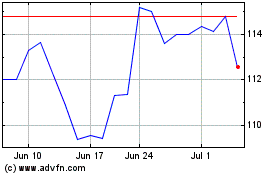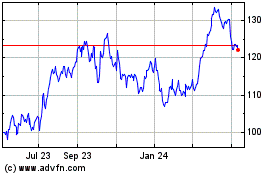Gas-Exporters Need to Collaborate, Share If Industry is to Grow, Executives Say
April 15 2016 - 4:22AM
Dow Jones News
By Robb M. Stewart
PERTH, Australia--In a world of constrained capital and
depressed energy prices, natural-gas exporters will need to work
more closely and find new ways to share infrastructure to grow,
industry executives say.
Collaboration emerged as a key theme at a major liquefied
natural gas conference held here this week against a backdrop of
weak oil and gas prices and an industry under pressure to protect
balance sheets. Australia has been an epicenter for
multibillion-dollar investments in liquefied natural gas facilities
in recent years, but also a string of delays and cost blowouts at
these big projects.
"We must put collaboration ahead of our industry's natural
desire to immortalize our own activities in concrete and steel,"
Andrew Smith, chairman of Royal Dutch Shell PLC's (RDSB) Australian
business, said in a speech closing out the gas conference.
"Australia's LNG industry will deliver greater economic value
and better international competitiveness when we get better at the
sharing of infrastructure on commercial terms," Mr. Smith said.
He echoed comments made during the week by executives at other
major energy firms. Total SA (TOT) Chief Executive Patrick Pouyanne
said it was the duty of companies to cooperate to improve project
economics, while Woodside Petroleum Ltd.'s (WOPEY) boss suggested
cooperation could be extended to sharing intellectual property
under license to help speed up industry advancements in
technology.
In an interview ahead of the conference, Geoffrey Cann, Deloitte
Touche Tohmatsu's Australia director for oil and gas, said
companies need to avoid getting swept up in a groundswell of
enthusiasm and "get it done at all costs" mentalities.
"The industry needs to collaborate a lot more to deliver
projects at a dramatically different cost formula than they can
achieve by just developing them on their own," he said. "If they
are unable to figure out how to do that, then these projects will
struggle economically in the long run."
Mr. Cann said energy companies don't ultimately need to own some
infrastructure after it is built, potentially opening it to
shareholders, such as pension funds, that are happy to own a
long-life, low-return asset like a pipeline.
Shell's Mr. Smith in his speech said even greater collaboration
is needed to rein in costs.
"As industry leaders we must come to terms with the fact that
local opportunities exist in a world with constrained capital,
particularly in a period of depressed commodity prices, and
collaboration will be key to continued growth," he said.
Energy companies regularly join forces. One of the most recent
LNG projects to begin production, the Chevron Corp. (CVX)-led
Gorgon project off Western Australia, brought in companies
including Shell and Exxon Mobil Corp. (XOM) But executives said
cooperation needs to be extended.
On Thursday, the Australian Competition and Consumer Commission
granted three recently developed LNG projects on the country's east
coast the right to share for a five-year period maintenance
schedules, providers and techniques. The change will allow the
plants, all closely located, to better coordinate the use of a
limited number of independent maintenance crews to help avoid
disruptions.
Mike Utsler, chief operating officer at Woodside, said the
Perth-based company had approached companies including Chevron and
ConocoPhillips (COP) about approaching the competition regulator to
see maintenance cooperation extended to LNG operators in
Australia's north and west.
There is an imperative for the industry to come together to look
at collaboration and standardization operations to survive and
thrive, Mr. Utsler said.
Write to Robb M. Stewart at robb.stewart@wsj.com
(END) Dow Jones Newswires
April 15, 2016 04:07 ET (08:07 GMT)
Copyright (c) 2016 Dow Jones & Company, Inc.
ConocoPhillips (NYSE:COP)
Historical Stock Chart
From Mar 2024 to Apr 2024

ConocoPhillips (NYSE:COP)
Historical Stock Chart
From Apr 2023 to Apr 2024
